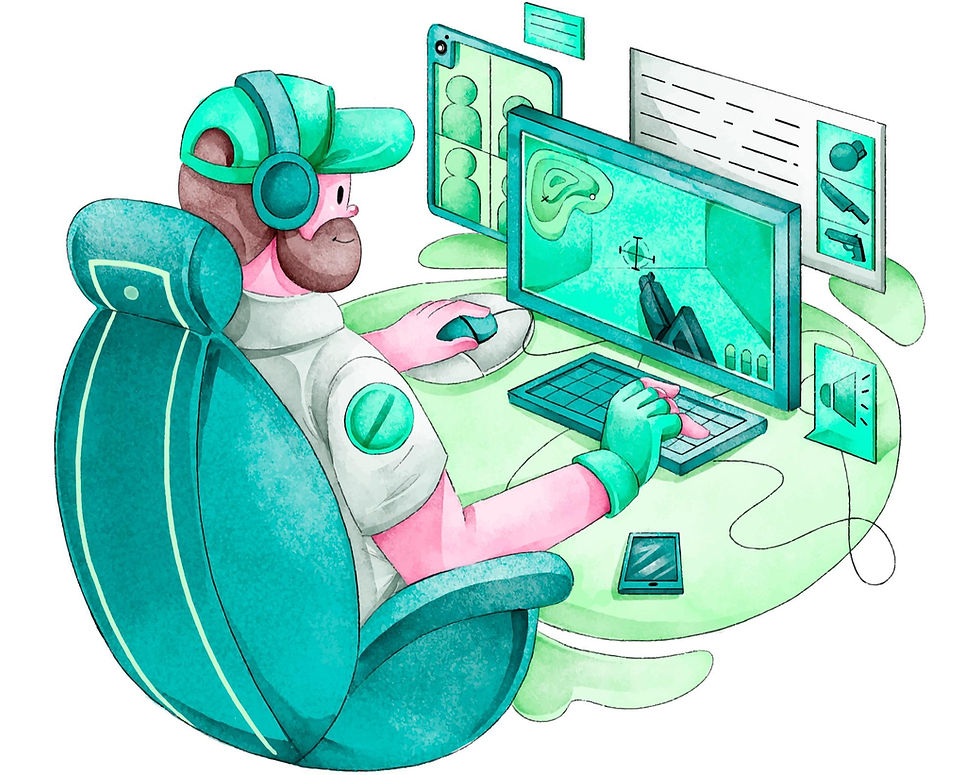AI in Game Development: How Smart Games Are Changing the Way We Play and Learn
- Suhada Khan
- May 31, 2025
- 3 min read
Updated: Jun 2, 2025
Imagine a video game that gets smarter every time you play it. A game that learns your moves, adjusts its difficulty, and even teaches you math while you're fighting dragons. Sounds like science fiction? Thanks to AI in game development, it’s real—and it's already changing how students play and learn.

Table of Contents
Introduction: From Controllers to Code
If you're a student who loves video games, you're not alone. But here's a twist—what if your games could learn from you?
That’s the magic of AI in game development. Game developers are now using artificial intelligence to create smarter characters, adaptive levels, and personalized learning experiences in games. From Minecraft mods to Roblox worlds, students in Grades 6–12 are not just playing games—they’re building them with AI.
In this blog, we’ll explore how AI in game development works, why it's changing the way we learn, and how you can be part of this exciting trend.
What is AI in Game Development?
AI in game development means using computer intelligence to make games more realistic, fun, and interactive. It helps characters:
Think like humans
Make decisions
Learn from player behavior
Adapt to different skill levels
Example: In chess games, AI predicts your next move and adjusts its strategy. In battle games, enemies get smarter as you level up.
Popular games using AI:
Minecraft (AI mods for building and behavior)
Fortnite (AI opponents in Battle Royale)
Among Us (AI bots when players leave)
Game-Based Learning: Trends and Innovations for 2025
In 2025, the line between "games" and "education" is vanishing. This is called game-based learning, where students learn concepts through fun and interactive gameplay.
Top trends in 2025:
Adaptive Learning Games
Games that adjust difficulty based on the player’s strengths and weaknesses.
AI-Powered Storylines
Games with storylines that change depending on your decisions—teaching logic, language, and ethics.
Multiplayer Learning Worlds
Games where students from different schools collaborate, solve puzzles, and learn together.
A Grade 7 student in Delhi created a math game that adjusts questions based on your accuracy using a simple AI model. That’s game-based learning in action.
Using AR/VR in Game Development
One of the coolest advancements in gaming is combining AR (Augmented Reality) and VR (Virtual Reality) with AI. This creates immersive, life-like experiences.
AR + AI = Interactive Worlds
Scan your room and fight off digital zombies or solve a math puzzle on your wall using your phone camera.
VR + AI = Realistic Simulations
Wear a VR headset and experience space travel, historical battles, or science labs powered by AI-driven NPCs (non-player characters).
AR/VR in game development makes learning visual, fun, and unforgettable.
How Educational Games Use AI
Educational games are designed to teach subjects like math, science, and coding—without feeling like homework.
Here’s how they use AI:
AI Feature | What It Does | Game Example |
Skill Tracking | Measures how well you're doing | Prodigy Math Game |
Personalized Quests | Gives you missions based on progress | Duolingo (language learning) |
Smart Hints | Offers clues when you’re stuck | Kahoot! adaptive quizzes |
By using AI, educational games keep students engaged and make learning a personalized journey.
Why Students Should Learn Game Development with AI
If you enjoy gaming, now is the perfect time to start creating your own games. With simple platforms like Scratch, Unity, or Roblox Studio—and AI tools—you can:
Build your own characters with smart behavior
Design quests that teach while entertaining
Add real-time scoring and feedback systems
Even create multiplayer educational games
Conclusion
The world of gaming is no longer just about fun—it's about future skills. With AI in game development, students are learning to think critically, design creatively, and even teach others using games.
Whether you're solving a puzzle with a robot sidekick or designing your own learning quest, the game-based learning innovations of 2025 are built for students like you.
Don’t just play games. Create them. And let AI make them smarter.
FAQs
1. What is AI in game development?
Ans. AI in game development refers to using artificial intelligence to make games smarter, more responsive, and personalized for players.
2. How does game-based learning help students?
Ans. It turns education into a game-like experience, making learning more engaging and helping students understand complex topics better.
3. What is the role of AR/VR in educational games?
Ans. AR/VR makes learning immersive by placing students inside 3D environments where they can explore and interact with subjects.
4. Can I learn to create AI games as a student?
Ans. Absolutely! Platforms like Scratch, Unity, and Roblox offer student-friendly ways to start building your own AI-powered games.





AI in games is honestly one of the most exciting shifts happening right now. It’s not just about smarter NPCs anymore — we’re seeing adaptive difficulty, procedural storytelling, and even AI-driven level design that reacts to how you play. That’s a huge leap from the static scripts most of us grew up with. What I find coolest is how AI is being used for learning. Games that adjust puzzles, combat, or narrative pacing in real-time based on your skill level are basically personalized tutors disguised as entertainment. It’s gamification done right. For anyone diving deeper into this trend, Click here — tons of resources popping up that show how AI can be integrated into both indie and AAA projects. The…